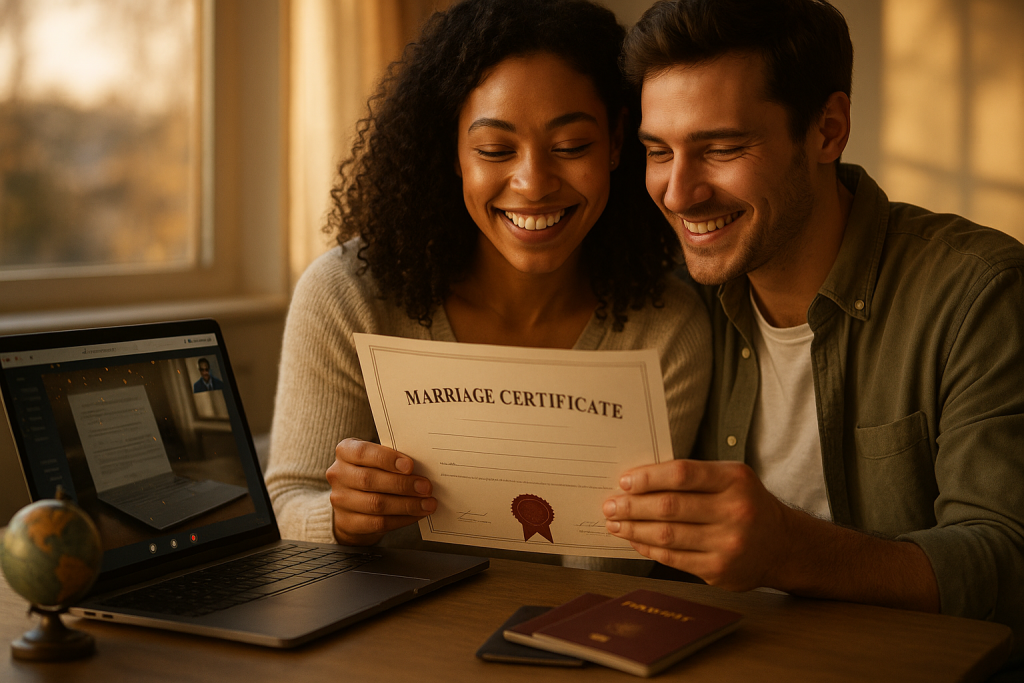Hey there! Planning to tie the knot but considering a virtual route? You’re not alone! Virtual marriage ceremonies have become a popular and convenient option for many couples. Let’s dive into some common questions to help you navigate this exciting journey.
What Is a Virtual Marriage Ceremony?
A virtual marriage ceremony is a wedding conducted online, where the couple, officiant, and guests connect via video conferencing platforms like Zoom. This allows couples to get married online without being physically present in the same location. It’s a modern twist on traditional weddings, offering flexibility and inclusivity.
Is Getting Married Online Legal?
Yes, in many jurisdictions, virtual marriages are legally recognized. However, laws vary by state and country. For instance, Utah offers online marriage licenses and ceremonies that are recognized nationwide. It’s essential to check the specific regulations in your area or consult with professionals to ensure your virtual wedding is legally binding.
How Do We Obtain an Online Marriage License?
Obtaining an online marriage license typically involves completing an application through a county clerk’s office that offers virtual services. Some states, like Utah, allow couples to apply for and receive marriage licenses entirely online. Ensure you have valid identification and meet any residency requirements stipulated by the issuing authority.
Can We Have Guests at Our Virtual Wedding?
Absolutely! One of the perks of a virtual wedding is the ability to include guests from around the world. Platforms like Zoom allow you to invite numerous guests to witness your ceremony live. To enhance the experience, consider hiring a virtual wedding videographer to manage the live stream and ensure a seamless event.
What Are the Technical Requirements for a Virtual Wedding?
To ensure a smooth virtual ceremony, you’ll need:
- A reliable internet connection
- A device with a camera and microphone (like a laptop or tablet)
- Access to a video conferencing platform (e.g., Zoom)
- Proper lighting and a quiet environment
It’s also wise to do a test run before the big day to troubleshoot any potential issues.
How Do We Choose an Officiant for Our Virtual Ceremony?
Selecting an officiant for your virtual wedding is similar to choosing one for a traditional ceremony. Many officiants are now offering virtual services. Ensure they are legally authorized to perform weddings in your jurisdiction and are comfortable conducting ceremonies online. Some platforms specialize in connecting couples with virtual officiants.
What About the Marriage Certificate?
After your virtual ceremony, the officiant will typically file the necessary paperwork with the appropriate authorities. Once processed, you’ll receive your official marriage certificate. The timeline and method of delivery can vary, so discuss this with your officiant beforehand.
Can We Personalize Our Virtual Wedding?
Definitely! Personal touches make your virtual wedding unique. Consider incorporating elements like personalized vows, a special backdrop, or even a virtual reception where guests can share their well-wishes. The possibilities are endless, and creativity is key.
What Are the Benefits of a Virtual Wedding?
Virtual weddings offer several advantages:
- Cost-effectiveness: Save on venue and travel expenses.
- Inclusivity: Allow guests from anywhere to attend.
- Flexibility: Plan your wedding on your terms and timeline.
- Safety: Especially relevant during health crises, ensuring everyone’s well-being.
How Do We Announce Our Virtual Wedding?
Announcing your virtual wedding can be done through digital invitations, social media, or a wedding website. Provide clear instructions on how guests can join the ceremony and any other pertinent details. Keeping communication clear ensures everyone is on the same page.
What If We Face Technical Issues During the Ceremony?
Technical glitches can happen, but preparation minimizes risks. Have a tech-savvy friend or professional on standby to assist with any issues. Conducting a rehearsal can also help identify and address potential problems before the actual event.
FAQs
Can we have a virtual wedding if we’re in different locations?
Yes, many couples opt for virtual weddings when they’re in different cities or countries. Ensure you comply with the legal requirements of the jurisdiction issuing your marriage license.
Do we need witnesses for a virtual wedding?
Requirements for witnesses vary by jurisdiction. Some states require them, while others do not. Check the specific laws in your area to determine if witnesses are necessary.
How do we handle the exchange of rings in a virtual ceremony?
You can exchange rings during the ceremony as you would in a traditional wedding. Coordinate with your officiant on how to incorporate this into the virtual format.
Can we have a virtual reception after the ceremony?
Absolutely! Many couples host virtual receptions where guests can give toasts, share stories, and celebrate together. Platforms like Zoom offer breakout rooms for smaller group interactions.
Is a virtual wedding less meaningful than a traditional one?
Not at all. The significance of your wedding comes from the commitment you and your partner make to each other. A virtual wedding can be just as heartfelt and memorable as a traditional ceremony.
Embarking on a virtual marriage ceremony is an exciting and modern way to celebrate your love. If you have more questions or need assistance planning your virtual wedding, feel free to contact us. We’re here to help make your special day as seamless and memorable as possible.




